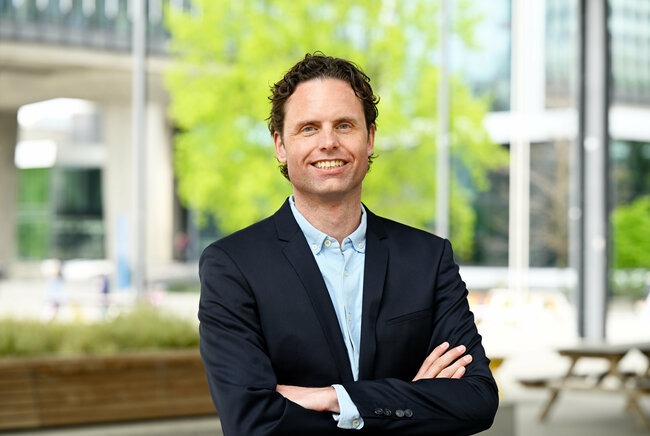Pioneer in synthetic biology and DNA data storage joins the Netherlands Academy of Engineering

Tom de Greef. Photo: Vincent van den Hoogen
As a fellow of the Netherlands Academy of Engineering (NAE), Professor Tom de Greef joins a select group of prominent professionals. All fellows of the academy have distinguished themselves through outstanding achievements in the engineering domain.
With the establishment of the NAE in 2023, the Dutch engineering community joined the ranks of countless other countries that already established National Academies of Engineers, notably the Royal Academy of Engineering in the United Kingdom and the National Academy of Engineering in the United States.
Storing data in DNA
De Greef, Professor of Synthetic Biology in the Department of Biomedical Engineering, is a pioneer in a growing body of work on DNA data storage technology. His work demonstrates how DNA, building blocks of living organisms, can also serve as a high-density, sustainable medium for data storage.
De Greef and his team are trailblazing for scalable, eco-friendly solutions to the global data crisis. They encode digital data into DNA strands and leverage innovative techniques like thermo-responsive microcapsules for data retrieval.
Digital infrastructures
Beyond its direct applications in data archiving, this research opens doors for integrating digital infrastructures into biology. This work contributes to critical fields such as artificial intelligence, secure data handling, and long-term medical record preservation, making it relevant across diverse sectors from healthcare to digital infrastructures.
The societal impact is substantial. DNA storage can make data more accessible, reduce environmental footprints, and ensure resilience against the increasing strain on traditional data storage systems. By driving innovation at the nexus of synthetic biology and information technology, De Greef’s work exemplifies how interdisciplinary engineering can address global challenges.
Impact for society as a fellow
As a newly appointed NAE fellow, De Greef is expected to play an active role in NAE’s mission: fostering a vital and effective environment of responsible, inclusive, and impactful engineering-based innovation and making the engineering community’s voice better heard among key decision-makers. NAE chair Henk van Houten told newspaper NRC last year: “If we find topics promising or important, we can also issue advice, primarily aimed at science and industry, fellows form a working group (..). The intention is to make such advice very practical.”
“As an NAE fellow,” shares De Greef, “I envision leveraging Pasteur’s Quadrant as a guiding principle to address societal and technological challenges in biomedical engineering.” This framework emphasizes the intersection of fundamental research and practical applications—targeting high-impact solutions that simultaneously advance scientific understanding and solve pressing societal problems.
Future of (biomedical) engineering
Biomedical engineers are vital for addressing complex challenges at the intersection of biology, engineering, and healthcare, yet they often lack representation in decision-making processes. By integrating cutting-edge approaches like precision medicine, AI-driven diagnostics, and sustainable bio-fabrication, biomedical engineers are key in tackling global health issues, from chronic diseases to aging populations.
“These topics are vital,” says De Greef, “as they combine technical feasibility with societal benefits, ensuring long-term resilience in healthcare and technology ecosystems.”
Today, the NAE is installing ten new Fellows and four new Young Engineers. With this expansion, the NAE network grows to a total of 91 prominent experts in the field of engineering-based innovations.
Article courtesy: Marjolein Pijnappels (Communications Adviser), originally published on the TU/e website under the title: Tom de Greef Appointed Fellow of Prestigious NAE.